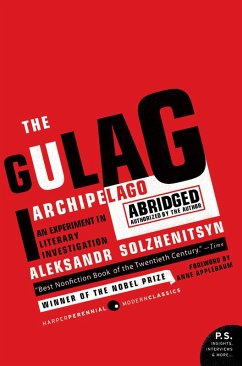BEST NONFICTION BOOK OF THE 20TH CENTURY. Time
It is impossible to name a book that had a greater effect on the political and moral consciousness of the late twentieth century. David Remnick, The New Yorker
The Nobel Prize winner's towering masterpiece of world literature, the searing record of four decades of terror and oppression, in one abridged volume (authorized by the author). Features a new foreword by Anne Applebaum.
Drawing on his own experiences before, during and after his eleven years of incarceration and exile, on evidence provided by more than 200 fellow prisoners, and on Soviet archives, Solzhenitsyn reveals with torrential narrative and dramatic power the entire apparatus of Soviet repression, the state within the state that once ruled all-powerfully with its creation by Lenin in 1918. Through truly Shakespearean portraits of its victims-this man, that woman, that child-we encounter the secret police operations, the labor camps and prisons, the uprooting or extermination of whole populations, the welcome that awaited Russian soldiers who had been German prisoners of war. Yet we also witness astounding moral courage, the incorruptibility with which the occasional individual or a few scattered groups, all defenseless, endured brutality and degradation. And Solzhenitsyn's genius has transmuted this grisly indictment into a literary miracle.
The greatest and most powerful single indictment of a political regime ever leveled in modern times. George F. Kennan
Solzhenitsyn's masterpiece. . . . The Gulag Archipelago helped create the world we live in today. Anne Applebaum, Pulitzer Prize-winning author of Gulag: A History, from the foreword
It is impossible to name a book that had a greater effect on the political and moral consciousness of the late twentieth century. David Remnick, The New Yorker
The Nobel Prize winner's towering masterpiece of world literature, the searing record of four decades of terror and oppression, in one abridged volume (authorized by the author). Features a new foreword by Anne Applebaum.
Drawing on his own experiences before, during and after his eleven years of incarceration and exile, on evidence provided by more than 200 fellow prisoners, and on Soviet archives, Solzhenitsyn reveals with torrential narrative and dramatic power the entire apparatus of Soviet repression, the state within the state that once ruled all-powerfully with its creation by Lenin in 1918. Through truly Shakespearean portraits of its victims-this man, that woman, that child-we encounter the secret police operations, the labor camps and prisons, the uprooting or extermination of whole populations, the welcome that awaited Russian soldiers who had been German prisoners of war. Yet we also witness astounding moral courage, the incorruptibility with which the occasional individual or a few scattered groups, all defenseless, endured brutality and degradation. And Solzhenitsyn's genius has transmuted this grisly indictment into a literary miracle.
The greatest and most powerful single indictment of a political regime ever leveled in modern times. George F. Kennan
Solzhenitsyn's masterpiece. . . . The Gulag Archipelago helped create the world we live in today. Anne Applebaum, Pulitzer Prize-winning author of Gulag: A History, from the foreword
Dieser Download kann aus rechtlichen Gründen nur mit Rechnungsadresse in A, B, BG, CY, CZ, D, DK, EW, E, FIN, F, GR, HR, H, IRL, I, LT, L, LR, M, NL, PL, P, R, S, SLO, SK ausgeliefert werden.



![The Gulag Archipelago [Volume 3] (eBook, ePUB) The Gulag Archipelago [Volume 3] (eBook, ePUB)](https://bilder.buecher.de/produkte/59/59822/59822073m.jpg)
![The Gulag Archipelago [Volume 2] (eBook, ePUB) The Gulag Archipelago [Volume 2] (eBook, ePUB)](https://bilder.buecher.de/produkte/59/59822/59822347m.jpg)




